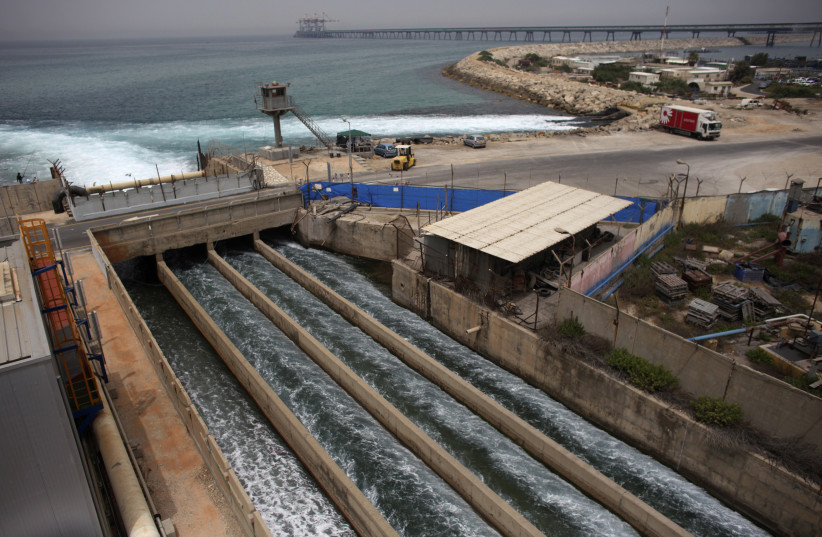Israel has gone from water scarcity to water surplus after seawater desalination plants located on its Mediterranean coastline came into operation. This is well known, but less known is that the seawater desalination plants, built and intended, have a number of limitations and downsides inherent in them. They will not, on their own, adequately address the problems that climate change will pose for Israel.
They will certainly provide more water, but this is not enough to combat climate change, and this water will be (if the plants’ power sources remain unchanged) at a substantial fossil fuel carbon emission cost, not to mention the other environmental pollution costs (for example, from the continuous dumping of brine byproduct into the sea).
Even if the reverse osmosis membrane desalination method is less costly in energy usage than evaporation methods of desalination, the desalination plants are still powered by electricity (derived from burning fossil fuels – coal and natural gas) or directly by natural gas (a fossil fuel).
The seawater desalination plants have inherent problems which are sometimes under-evaluated and require careful consideration and solutions. These arise from:

The problems of desalination
- High operational power costs (in terms of monetary cost and carbon pollution creation from power generation from electricity or gas).
- All are located along the Mediterranean coast, which will be negatively affected by sea levels rising and could also be negatively impacted by an underwater earthquake or volcanic eruption causing a tsunami (increasing offshore underwater mining of natural gas by Israel increases the possibilities of seismic disturbances which could cause a tsunami).
- Increasing pollution of the sea in the vicinities of the plants. Israel has a limited stretch of coastline, which will be negatively and cumulatively impacted with the addition of each new desalination plant. Also, one has to look at cumulative effects which might not be evident now but will increase day after day, year after year as each successive day of operation of each desalination plant sees another large dumping of brine into the sea. And this dumping is into the Mediterranean, which that is already suffering negative effects from climate change, such as warming and loss of species.
- The desalinated water produced by the plants is lacking in certain minerals needed for human health (e.g., calcium, fluoride, iodine and magnesium). These minerals are present in natural sweet water. The mineral deficiencies also negatively affect the mineral levels in crops grown from desalinated water, and this again negatively impacts human nutrition. These deficiencies create a need for mineral supplementation – either via adding these lost minerals back to the desalinated water or other means, something not yet adequately addressed in Israel.
- The lack of minerals in the desalinated water leads to faster corrosion and dissolution of the pipes carrying the water, and this leads to increased health risks from the pipe material entering the water supply.
- The desalinated water is slightly acidic; this can alter pH balances and lead to acidosis (a negative health effect).
- The substantial brine byproduct of the desalination process is currently thrown away and being dumped into, and polluting, the sea instead of being, if at all possible, economically used for its mineral content.
- Any desalination plant on the coastline at or adjacent to Eilat will probably be too damaging pollution-wise to the sensitive Red Sea underwater ecology in the area
- The large seawater desalination plants are owned and operated by private sector entities that have motives of generating monetary profits for themselves. This might create conflicts of interest between climate change mitigation and ecological protection needs and monetary profit motives – and whose interests will win out?
A key question requiring an answer is Are all current and proposed usages of desailnated water actually worthwhile at the macro level? For example, desalinated water could continue to be used to top up the Kinneret (Sea of Galilee) and in the future be used to top up the drying-out Dead Sea. But are the supposed advantages of using desalinated seater for these and other large-scale purposes worth the pollution costs arising from fossil fuel electricity production to power the plants and the dumping of brine byproduct into the sea?
Of what real use are solutions to some problems which themselves create other large problems unless they provide a very large incremental gain after subtracting the losses? And are the losses bearable?
What I am suggesting is that the future usage and location of seawater desalination plants needs to be part of an overall climate change mitigation strategy into which these plants are fitted, only after a proper total evaluation of their pros and cons has been done and all possible options in all spheres have been fully and properly considered.
Put another way, these plants should be an integrated component and not a driving force of a macro-level strategy. At the moment, no such larger strategy has been promulgated and accepted in the public domain in Israel. Apart from the large seawater desalination plants, there are a number of smaller brackish water desalination plants in Israel. I suggest that it would be a worthwhile exercise to reassess these in the light of current thinking and possibilities as part of a new grand strategy. ■
The writer is a retired chartered accountant and author of texts in the fields of animal rights, ecological protection, and numismatics. Contact: anpamm@gmail.com
